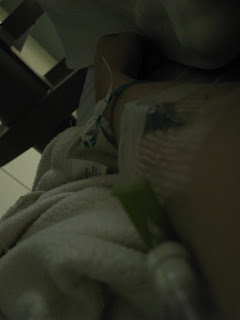
Walking up after a night of ambien & Benadryl induced sleep to the feeling of dry, chapped lips, plaque covered teeth, diffuse muscle aches, and gritty eyes glued shut by mucus overflow from my sinus always makes me want to stay asleep. . . . . . indefinitely.
At the very least, I want to reach for my pain control and stay in bed, refusing to move, possibly forever.
Rolling out of bed, I know everything is going to hurt.
Just waking up, is an exhausting chore. My eyes burn. My mouth feels foul. My muscles are screaming. My lungs burn from breathing. My joints ache.
I’m in pain, and I’ve just barely became awake.
This is not the way anybody should start their day.
My entire body is demanding, through all my aches and pains, that I just stay in bed. My body is hollering to roll over and give in.
Stay in bed, one more day. Don’t move. If you just stay still, maybe you’ll feel better.
I want so badly to listen to my body.
Most mornings, I wake up to this struggle.
My body tells me to sleep. It tells me to lie down, don’t move.
I get up anyway.
I roll over, slowly, put one for on the floor and then the other to feel the shock of pain when my soles hit the floor and radiates up my legs.
My joints creek like I’m bending them within an inch of their life.
My muscles threaten to stop working all together and drop me mid-movement.
This is my daily mind-body battle.
I know, within myself, with all the strength and determination of my personality, that the signals my body is sending me, the signals to roll over to sleep, to refuse to move, to stay in bed indefinitely, is NOT what is best for my body.
It is an exhausting internal struggle for health.
My body, and all my nervous system signals, are screaming, hollering, rioting, telling me to stay stll, stay in bed, the pain, the weakness, the suffering is so much.
My mind, my personality, my inner essence that is determined to heal, knows better.
I always get up.
I feel like “Old Man Winter” in the Chris Cringle movie. I just need to put one foot in front of the other.
But damn, every single morning?
I’m pretty sure this is what people are referring to when they tell cancer patients to “stay strong” and “keep fighting.”
I’m fighting the urges of my body.
I’m fighting the signals that tell me my mouth hurts too badly and my sores are too painful to eat so I keep eating and drinking.
I’m fighting to keep my thoughts stronger than my body’s pathology.
I’m fighting just to roll over, stand up, and put one foot in front of the other to walk, because I know if I don’t, I may lose the ability all together. The process may be too painful later.
I need to stand up and keep moving despite every internal signal telling me otherwise.
I always do.
That’s why I survive so long.
I get up, roll out of bed. I set one goal for the day. One action I want to accomplish. A goal that is adjusted in accordance with current circumstances and health status.
I want to sit unassisted.
I want to walk to the kitchen.
I want to dress independently.
I remember that little accomplishments are great in my circumstances.
I don’t think about the ten steps back I took in recovering to get where I am.
I readjust, roll with the punches. I accept my immediate status.

I do not, can not, waste time thinking of what could have been.
I think of what will be, and the steps I need to get there.
Then, without hesitation, I do them.
Again and again. Over and Over. For years now, this has kept me alive.
It has kept me functioning better than most do after similar treatment.
I roll out of bed every day. I shower. I change my clothes.
If this is all I do for the day, I have still done something.
I’m still refreshed. I’m still capable.
I still have hope.
 First things first, Health Care Professionals, DO NOT, create a new fake policy or an extra piece of ridiculous paperwork to fill out on admission and post a memo from the unit manager in the staff room requesting immediate implementation.
First things first, Health Care Professionals, DO NOT, create a new fake policy or an extra piece of ridiculous paperwork to fill out on admission and post a memo from the unit manager in the staff room requesting immediate implementation. 



























